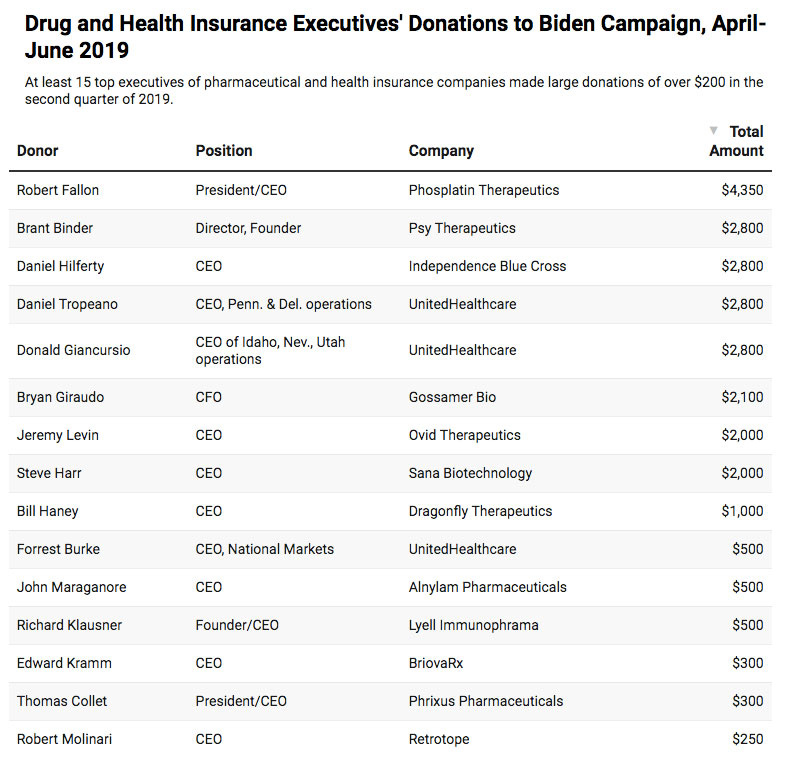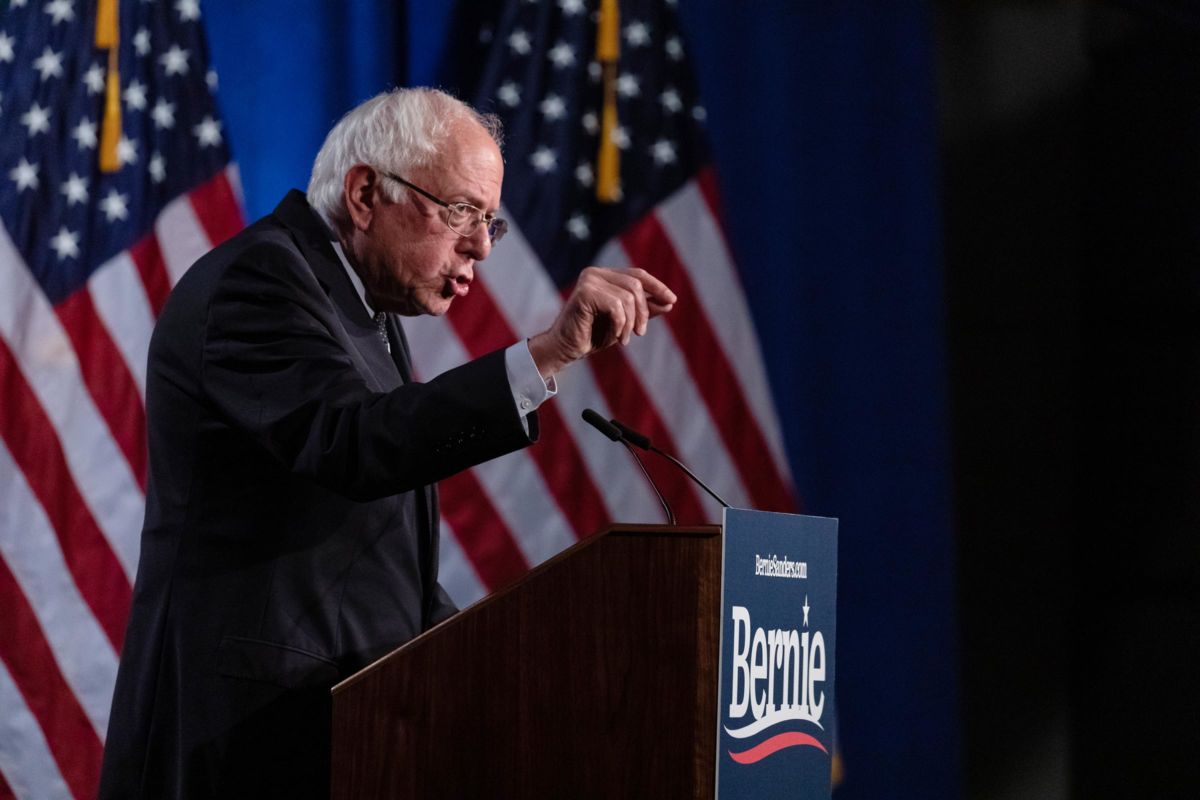Two frontrunners in the Democratic presidential primary have been duking it out over their health plans in recent days, with former Vice President Joe Biden introducing his plan for a public option on Monday, in contrast to Sen. Bernie Sanders’ (D-Vt.) Medicare for All plan, which would mean the end of private health insurance in favor of a single-payer system with no premiums, deductibles, or co-pays.
On Wednesday, Sanders pledged to reject all contributions over $200 from the PACs, executives, and lobbyists of pharmaceutical and health insurance companies, and he challenged his primary opponents to do the same. His campaign website lists drug companies that are members of the largest pharma trade association in the country, Pharmaceutical Research and Manufacturers of America (PhRMA), and the drug health insurers that are part of the trade group America’s Health Insurance Plans.
“If we are going to break the stranglehold of corporate interests over the health care needs of the American people, we have got to confront a Washington culture that is corrupt―that puts profits ahead of the needs of the American people,” Sanders said during a speech in Washington on Wednesday.
If Biden were to sign on to Bernie’s pledge, he’d need to turn off the spigot of health industry executive donations that are flowing into his campaign. According to a Sludge review of Biden’s second-quarter campaign finance report, at least 15 top executives of pharmaceutical and health insurance companies made large donations to the campaign.
These include maximum donations of $2,800 from Dan Hilferty, CEO of Blue Cross Blue Shield (and another $2,800 from his wife, Joan); Donald Giancursio, CEO of insurer UnitedHealth Group’s operations in Idaho, Nevada, and Utah; Daniel Tropeano, CEO of UnitedHealth Group’s Delaware and Pennsylvania branches; and Brant Binder, a director and founder of Psy Therapeutics. Robert Fallon, CEO of Phosplatin Therapeutics, gave the Biden campaign $4,350, which includes $1,550 for the general election if Biden wins the primary.
In his Washington speech, Sanders suggested that presidential candidates who might refuse to return contributions like these should explain why pharma and insurance CEOs think their donations are “good investments.”
Here are the 15 executives and their contributions.

Lower-level executives, including a number of vice presidents of drug companies such as Celgene, Johnson & Johnson, Merck, Novartis, and Siemens, as well as of PhRMA, also gave large donations to the Biden campaign.
In addition to making direct campaign donations, a high-ranking company official will often donate to their corporate PAC, which then donates to candidates the PAC supports. Pharmaceutical manufacturing PACs made over $10.3 million in donations to federal campaigns in the 2018 election cycle, giving slightly more to Republicans than to Democrats. During that cycle, PACs and individuals in the health sector spent a total of $265 million on federal elections, the fifth-largest total among 13 sectors analyzed by the Center for Responsive Politics.
And the donations appear to work: In January 2018, the Center for Responsive Politics found that the more campaign cash that members of Congress received from drug and health insurance company PACs, the less likely they would be to support single-payer legislation. Pharmaceutical and health insurance companies also make big donations to outside groups such as the Partnership for America’s Health Care Future that spend money to advance the industry’s interests.
Breaking a Pledge?
Biden, who pledged to reject donations from federal lobbyists, returned $2,800 from Andy Chasin, director of public policy at health insurance company Blue Shield of California, who has lobbied Congress on “pharmaceutical pricing” and “insurance market stabilization” this year.
The campaign returned other donations from additional lobbyists, but Sludge identified three federal lobbyists whose donations were not refunded:
- Marcus Mason ($750) of The Madison Group LLC, whose current clients include Google and student lender Navient, and who lobbied for pharmaceutical company Mylan through the fourth quarter of 2018;
- Sara Morris ($1,000), an in-house lobbyist for media giant iHeartMedia, who lobbied Congress on intellectual property and licensing, among other issues in 2019’s first quarter; and
- Stuart Eizenstat ($2,800), a former fossil fuel and defense lobbyist who was most recently registered to lobby for Central European Media Enterprises and The Artoc Group, of Covington & Burling LLP. Eizenstat, who is advising the Biden campaign, told Politico in April that he is not longer lobbying, but the Senate lobbying database contains no recent termination reports from Eizenstat.
The Biden campaign did not return emails requesting comment.
Biden appears to be at least attempting to abide by his no-lobbyist-donation pledge, but he’s been holding fundraisers with some of the nation’s top corporate government affairs figures. On the day of his official campaign announcement, Biden had his first campaign fundraiser at the home of David Cohen, the head of Comcast’s lobbying operation. (Cohen himself is not a registered lobbyist.) Since then, Biden has gone from top-dollar fundraiser to top-dollar fundraiser, making use of his extensive rolodex of lobbyists, former ambassadors, and corporate allies to raise the second-highest total among Democratic presidential contenders in the second quarter: $22 million, 38% of which came from small donations of $200 or less. Sanders, who eschews fancy fundraisers in favor of online donations and on-the-ground organizing, raised $18 million in quarter two, with 70% of that total coming from small donations.
Biden argues that to fix America’s overpriced health system that still left 27.4 million people uninsured in 2017, the government needs to improve upon the Affordable Care Act, keeping the current system largely in place and adding a public option. But Biden has made inaccurate statements about Sanders’ Medicare for All plan that mirror some made by astroturf health industry front groups. The former vice president claimed that there would be “risky” gaps in coverage between the current system and Medicare for All. CNN rated this claim misleading.
The former Delaware senator is also criticizing Sanders’ new version of Medicare, warning that it won’t be the same as what Medicare recipients have currently. That’s true, in fact, but not the way Biden implies: The new Medicare will add vision and dental coverage.
As Biden campaigns on health care, he’s likely getting advice from one of his campaign chairman, his former chief of staff Steve Ricchetti — a former health insurance and pharmaceuticals lobbyist. Over his long lobbying career, Ricchetti represented drugmakers Novartis, Eli Lilly and Sanofi as well as the American Hospital Association. His brother, Jeff, with whom he founded a lobbying firm, is still a registered federal lobbyist and currently represents pharmaceutical company Eisai, Inc., a U.S. subsidiary of a Japanese firm.
Biden’s independence on other major campaign issues is undermined by additional campaign officials with close ties to big business. On climate change, for example, Biden chose as his top adviser Heather Zichal, a former adviser to Barack Obama who earned over $1 million from a board seat at a liquified natural gas company from 2014-18.
Join us in defending the truth before it’s too late
The future of independent journalism is uncertain, and the consequences of losing it are too grave to ignore. To ensure Truthout remains safe, strong, and free, we need to raise $22,000 by the end of today. Every dollar raised goes directly toward the costs of producing news you can trust.
Please give what you can — because by supporting us with a tax-deductible donation, you’re not just preserving a source of news, you’re helping to safeguard what’s left of our democracy.
